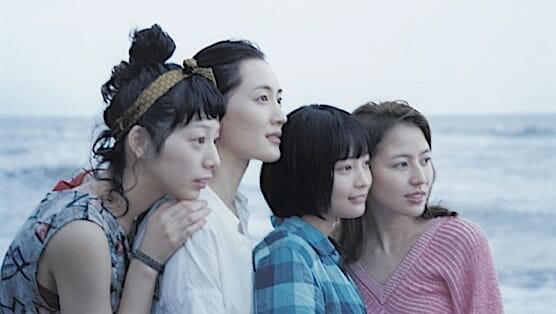Our Little Sister (2015 Cannes review)

In the last 10 years, Japanese filmmaker Hirokazu Kore-eda has enjoyed his biggest international success exploring family matters. Whether it’s the abandoned-children opus Nobody Knows, the grieving-family drama Still Walking, or the switched-at-birth tearjerker Like Father, Like Son, Kore-eda has shown an affinity for probing the ways that those closest to us cast a long shadow over our lives—even after they’re dead.
His latest, Our Little Sister, exudes the same sentimental, unhurried tone of Still Walking and Like Father, Like Son, and to be sure it’s a simple tale without many surprises. But in Kore-eda’s hands, that slightness can feel elemental, timeless. He fills his movie with such sympathetic souls you might not mind that he’s not saying much new about sibling relationships or being someone’s child well into adulthood.
The movie opens as three adult sisters—Sachi (Haruka Ayase), Yoshino (Masami Nagasawa) and Chika (Kaho)—discover that their long-absent father has died. Traveling to his funeral, the women (all in their 20s) realize they’re finally going to meet their half-sister, 13-year-old Suzu (Suzu Hirose), a daughter he had with his new wife after abandoning them and their mother. But instead of being hostile toward Suzu, the women feel a strange kinship to her, inviting the teenager to move in with them in their family’s house.
Based on Yoshida Akimi’s graphic novel Umimachi Diary, Our Little Sister centers on four characters, although three of them receive the most scrutiny. The Koda sisters are all unmarried, living together in their family home but with their own lives. Sachi, the oldest, is a nurse and has always been an overachiever, which makes the fact that she’s secretly dating a married man all the more shameful to her. (Part of her shame comes from the recognition that she’s despised her father for, essentially, doing the same thing as she’s doing now: having an affair and potentially breaking a family apart.) Yoshino works at a bank and is generally directionless, while Chika spends her time at a dead-end job at a sporting goods store.
None of these women are in any sort of immediate peril, but their unspoken desire to adopt Suzu as their own child speaks to unacknowledged longings. Does Suzu understand the Kodas’ ulterior motives? Kore-eda won’t say, and boosted by Hirose’s understated performance Our Little Sister keeps Suzu a teasing mystery. That’s appropriate for a character who the other women don’t necessarily look at as a person. Rather, the Kodas seem to be searching for some hints into the man their father became. Consequently, Suzu is a riddle that they all delicately want to solve.
-

-

-

-

-

-

-

-

-

-

-

-

-

-

-

-

-

-

-

-

-

-

-

-

-

-

-

-

-

-

-

-

-

-

-

-

-

-

-

-








































